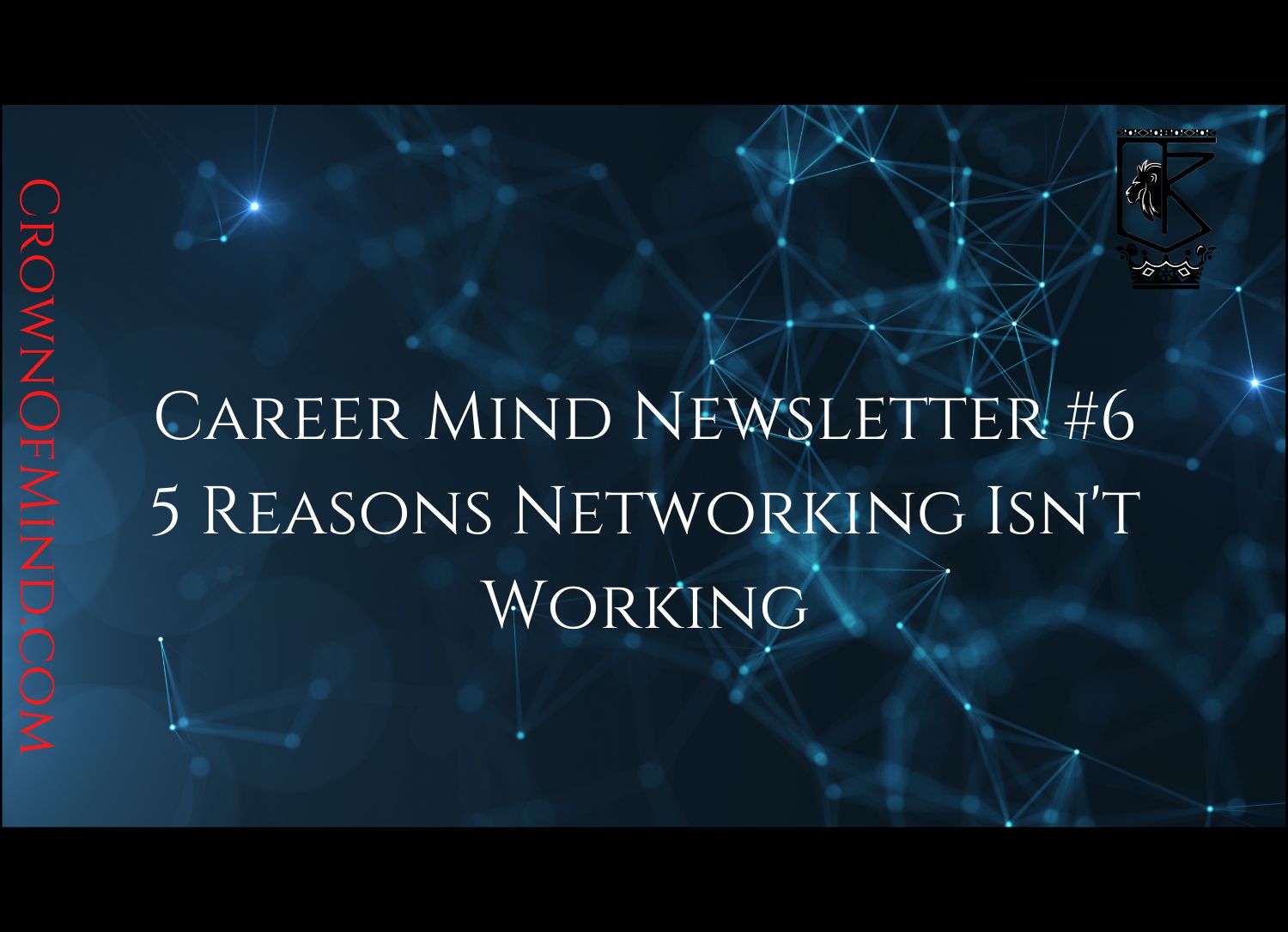There are thousands of pieces written about this subject. Videos, whole courses to explore on networking because it’s such an important skill for career and life development.
At its core, networking is a necessary survival / thriving skill because we live interdependently; our basic and luxury experiences are predominantly constructed through others, ideally with our skills contributing to society in some form.
Unless you grow your own food all of the time, make all your own clothes, discover all of the materials for those clothes on your own, create your own electronics, build your own homes, create every shop you purchase from, set up your own schools and do everything else outside of human contact, we need successful communication with others to realize goals. Networking’s value increases as we increase our standing in the world and have more influence.
The skill is transferable; networking outside a work environment requires the same abilities as inside.
When it comes to creating more career opportunities, networking is prerequisite. With the current economic environment [debate recession or not], the workplace chessboard is shifting pieces around.
No need to sugarcoat: there will be more job losses as it’s the Fed’s intention for “slowing the economy” and some companies are taking action accordingly.
This doesn’t mean it’s impossible to secure new opportunities. It does mean that more people will default to the easiest action for an outcome, job applications.
Imagine thousands more people resorting to only applying online and how that may look from an employer’s perspective. They have more apps to deal with, which means you could be in a longer digital line.
Networking can be a method to differentiate you from the thousands who only do applications by discovering ways to speak directly with company contacts and other professionals.
What I’ll cover here are not methods but the mindsets that tend to discourage professional relationships from evolving beyond the surface. For specifics, check out my conversation with Enterprise Security Tech.
You can have the templates with well-crafted hacks but if these below exist, you risk sabotaging what could become important support systems over the long-term.
1. You see networking as a transaction.
When thinking of a “transaction” one might conjure up an experience of going to the local mall, to a store one might not be too familiar with but convenient enough to purchase from. They have the item needed, so it’s selected and bought at the register.
There’s no connection to the location, customer rep at the counter or perhaps even the product.
“How much is it?”
“$20.” Give the $20. Receive the product. Receive the receipt. Deal is done.
A few words exchanged, the most superficial formality necessary to complete the transaction.
Transactions don’t require connection. Self-understanding or understanding others. They don’t require knowledge of another person. Minimal rapport.
Viable networks are unable to exist in this environment. They’re unsustainable. Like anything that needs care and cultivation for growth, a network develops through time, trust repeatedly expressed.
The strength of your network is shown in how you respond when you receive what you want or don’t, and reasons for connecting. Only speaking to someone when you want something then discarding once achieved is a sure way to dissipate your relationship.
2. You think networking is only for jobs.
In the traditional sense, networking would involve RSVPing for events where you wear a tag, often color-coded with an industry label. People who tend to behave transactionally walk around to look at each other’s labels, skip over people with the “wrong” tag and speak to those with the “right” tag, “Hi, so what do you do?”
If your answer isn’t to their liking, they make nice and find a way to move on.
Such is the work of amateur networkers who have a habit of reducing people mainly to what they do and how they can provide a job.
Pre-pandemic, savvy tech recruiters would attend events without overtly disclosing their status so they could chat with prospects and learn about them without being engaged in transactional ways.
“How do you engage when a job isn’t the conversation topic?” — this is the curiosity.
I remember a case where one of my alums attended an in-person, pre-pandemic event and sat next to a company recruiter, unknown to him at the time. After a positive conversation the recruiter revealed the status and then discussed job-related topics.
Some people observe how you treat support staff to gauge whether or not to further converse.
There are a few in my network who are just fine with people being forthright about job interests but even they would be turned off by someone who couldn’t build rapport or show any genuine interest in speaking with them along with a job opening.
Once a person senses they’re just a means to an end they’re likely to be turned off, and remove any chance you had of receiving advocacy.
A referral is more than just a name. Behind that name is some person who developed a reputation and willing to place it on the line in support of your application.
There are multiple reasons for reaching out to someone beyond a referral:
- Discovery: learn about that person’s experience. How they developed in the industry. Their starting points and challenges. How they leapt over similar challenges you have.
- Industry Knowledge: what do they study? What do they recommend you study? What resources do they work with to build skills?
- Networks: which groups do they join? What communities do they recommend joining for someone at your stage?
3. Your energy is disingenuous.
I like to relate this to any time you made a friend and how authenticity was an important part of that relationship developing. It likely wouldn’t have become anything of substance if you noticed the friend was being fake, only wanting something from you or willing to discard you after receiving something.
One quality that tends to fortify authenticity is time; with time trust is nurtured.
Time enables both sides to see how each relates through favorable and unfavorable experiences. Solidifies the friendship.
For someone to trust you enough to want to help you, they will want to sense some degree of authenticity and the willingness to commit some time to connect. The time length could differ. Maybe it’s one quality conversation. Maybe it requires five.
Professionals in relationship-oriented businesses will tell you that clients may not say Yes the first time. Contract consideration has to be nurtured. Through consistent, authentic demonstrations the trust is established. It can take weeks to build and one moment’s goof to destroy it.
For dream companies, the time to build network contacts with them isn’t only when you see the job opening. The time was last week. It’s now.
You can contact people at the company immediately for many of the above reasons mentioned outside of a job. By being curious and genuinely wanting to learn about how the people who are already there do what they do best, you cultivate a circle well before you decide to hit that apply button.
4. You’re unsure of the value you have to offer.
The kind of networking we’re discussing here implies two-way value. There will be times where someone is explicit about the kind of support they can provide and have no expectations of receiving. This could be a referral.
But if you’re contacting people you don’t know, particularly at a peer level you can enhance the experience by knowing what value you contribute.
This “value” could be time, extending a hand to support when needed, asking how you could assist them, skill exchange from another one of your talents, someone you may know to connect them with. The only way to gauge this is to take the focus solely off of self and commit to active listening about their interests.
5. You haven’t invested in communication skills.
At the core of networking is the communication art, including written, oral and the somatic (bodily). Underlying these is mental state which influences the kind of energy you carry into any social interaction, a reference to Emotional Intelligence and Nunchi.
People can instinctually sense vibrancy just as much as they can desperation or cold-heartedness.
Human instincts tend to respond quickly, so if any of these elements is off-putting, you’ll communicate an off-putting vibe. It’s enough to convert an “I’ll work with you” to a “Nah, let’s not work together.”
Understand your baseline communication style (introvert, extrovert or some blend of each) and invest time to honing each of the dimensions.
Investing in communication skills compounds with time and in my view one of the most underrated powers.
Improved written communication can make you a more effective persuader or information sharer. It can help you make your points with greater confidence. Your intro messages, thank you letters and subsequent Emails become more effective. If you intend to work remote, this necessary for digital comms.
Improved oral communication can enhance the influence you have in interviews explaining experiences, precision with how you deliver ideas, also empowering persuasion. It can help you ask the targeted questions to obtain the information desired.
Somatic communication involves all of the non-verbal cues given off consciously or subconsciously. Eye contact, posture, hand gestures, tonality, the overall way you hold bearing in your body signal your mind state without having to say a word.
For each skill you can consciously develop them through practice and knowledge.
Field work provides real-world feedback.
For writing, write more. Speaking, speak more. Somatic, have more meetings where you are seen in-person or virtually. Record yourself.
Avoidance will only put you in situations where you have to execute when it matters, and do so underdeveloped.










